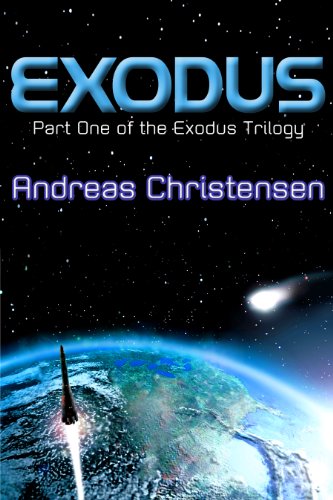It's a terrifying idea: a massive object from space is on a collision course with the Earth. It's terrifying because we could see it coming, but we'd be powerless to stop it. Of course, such Hollywood movies as Deep Impact and Armageddon have imagined ways people could redirect or destroy the comet/meteor. But what if the object was so large that it would be impossible to redirect or destroy it? This is what Andreas Christensen (what a name!) aims to examine in his Exodus trilogy, beginning with his first book, Exodus. The idea isn't original, but it's so fascinating that it's tough to pass by a story that decides to examine it, whether it's a story that you might find on a cheap Syfy movie or a big budget Hollywood blockbuster. As interesting as parts of this book are, it suffers from the marks of an amateur writer. The pacing is off, the character development is poor, and the book just plain suffers from boredom due to repetition and an over-reliance on explaining things.
The prologue introduces a rogue planet that is destined for a collision course with the Earth. Luckily, though, Mars was in the way. Or maybe not so lucky, since the collision with Mars has set the planet in an orbit towards the sun in which it will collide with Earth. Why did nobody notice a rogue planet hurling through the Solar System, you might be wondering? In this version of Christensen's planet Earth, the United States has decided to stop funding NASA because of a terrible tragedy during an expedition to Mars. To make matters worse, the U.S. government had been eroding its basic protections for people, such as the First Amendment, for decades (this takes place in 2070). This is perhaps where Christensen adds something unique, in the addition of a political tyranny of sorts. It's unfortunate that he doesn't fully explain this erosion of rights. It's not clear exactly what is not allowed and what the consequences are for breaking that law. Again, the mark of an amateur author. Maybe Christensen barely knows himself.
Essentially what the conflict boils down to are two things. One, scientists attempt to come up with a way that they can launch a small number of people into a gigantic ship so that they can colonize a distant planet. They only have twelve years before the rogue planet smashes into Earth. I think Christensen is pretty generous here, but in fairness, when all the world's scientists are focused on this problem, I guess it could maybe be possible. The other conflict involves a small number of people who would like to sabotage the plans, politically at least. Not everybody is happy with the direction the United States government was continuing to head, and with the current president in charge of the mission, it seems likely he will attempt to further his regime on this distant planet. So this rogue group wants to get people on board who make sure a better government is in place.
Notice I haven't mention a single name. There are lots of characters, but zero personalities. Tina Hammer, who opens the book, is notable, as Christensen describes her, because she is an African American woman who is a fighter pilot. There's also Maria Solis, a Latino girl whose parents are high up in what is called the Consortium, which seems to be a conglomerate of businesses that have a lot of power and access to government information. Honestly, there are others, including a senator, an FBI agent, a psychologist, and a mix of people chosen to train for the Exodus expedition, but I can hardly remember who's who.
As I said, the solutions to the problem of migrating a population across a massive amount of space is solved rather quickly. Scientists discover a good planet fairly quickly. They solve the problems of speed quickly. They figure out how to create cryogenic sleep rather quickly. Those who've read any Arthur C. Clarke may remember that it took the scientists in Songs from a Distant Earth several centuries to come up with all of this. In fact, Christensen could probably learn a thing or two from Clarke. Human philosophy is often more interesting than a how-to guide in getting us up to space. Christensen's science isn't very specific, not like Andy Weir's in The Martian, but his story does get bogged down too much in mechanics and not enough in humanity. It's amazing how calm people seem to be considering their imminent doom. At the end there is a little bit of chaos, but this doesn't seem to really reflect human behavior in this scenario.
I've begun reading the second book before writing this review, and I will say that Christensen hunkers down and focuses his story a lot better. We get a better look into the characters and motivations and we get much more coherence, rather than a randomly organized set of problems and solutions that Christensen presents here in book one. I considered giving up, but it's a short book, so I finished it. This is tough to recommend though. Serious fans of sci-fi will grow bored with the paper-thin development. Notably, there is a strong lack of any original ideas, with an exception of the political suppression. It's a shame Christensen chose to spend so long on this aspect of the story. Clarke used this sort of story as background in his Songs from Distant Earth, and Christensen proves the wisdom in Clarke's choice by expanding the background story into a full, tedious novel.

No comments:
Post a Comment